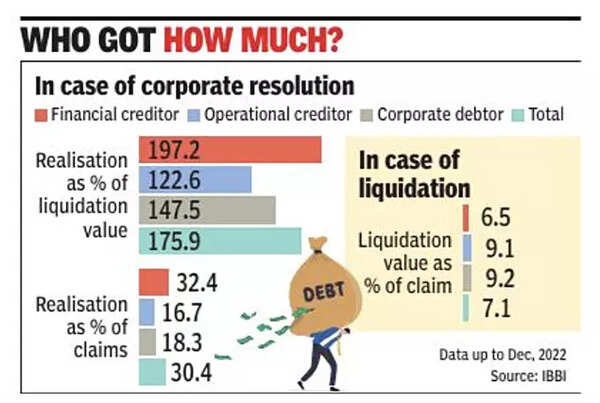Ibc: IBC rejig: Better realisation for operational creditors – Times of India
The draft to amend the Insolvency and Bankruptcy Code (IBC), which was floated for consultation, had suggested segregating the resolution plan from the manner of distribution of the proceeds received from the successful resolution applicant.

Besides, to address concerns over “inequitable distribution” among creditors, a separate waterfall mechanism has been proposed under which the creditors will receive the proceeds up to the liquidation value provided for under section 153 of IBC. Any surplus is then proposed to be distributed between all creditors in the ratio of their unsatisfied claims. And, any surplus would be distributed to the shareholders and partners of the corporate debtor, or company.
While a final decision on the Bill to amend IBC has not been taken by the ministry of corporate affairs yet, officials said that the move, which has come in for criticism from certain quarters, came about due to concerns from operational creditors, including government agencies and statutory bodies, which have been complaining of low realisation during the resolution process.
Officials said that this has often led to disputes, such as the authorities in NOIDA or the Yamuna Expressway Industrial Development Authority raising issues in the Jaypee Infratech resolution, which delays the process.
IBBI data had shown that up to December, financial creditors managed to get 32.4% of their claims, while it was almost half in the case of operational creditors (see graphic).
An analysis has indicated that the financial creditors may not lose any significant share but can hope for faster completion of the resolution process. Bank representatives were involved during the consultation process, and they had backed the proposal, officials said.
They also argued that government dues were not given primacy during the time IBC was planned as the idea was to help banks recover their dues, given the massive pile-up of bad debt. The experience so far has, however, shown that the government and the other operational creditors were losing out and their claims were coming far lower in the priority list.
Officials argued that when it comes to other operational creditors, such as vendors, their claims are settled outside the IBC process, which is reflected in a withdrawal of a large number of petitions that are filed in the NCLT.
For all the latest business News Click Here

